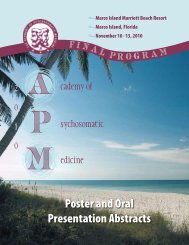Table of Contents - Academy of Psychosomatic Medicine
Table of Contents - Academy of Psychosomatic Medicine
Table of Contents - Academy of Psychosomatic Medicine
You also want an ePaper? Increase the reach of your titles
YUMPU automatically turns print PDFs into web optimized ePapers that Google loves.
35. Decision-Making Process Involved<br />
in Living Kidney Donation in Japan: A<br />
Qualitative Research Study<br />
Presenting Author: Katsuji Nishimura, MD, PhD<br />
Co-Authors: Sayaka Kobayashi, MA, Sachi Okabe, Hideki<br />
Ishida, MD, PhD, Kazunari Tanabe, MD, PhD, Satoshi Teraoka,<br />
MD, PhD, Yoshie Okada, DNSc, Jun Ishigooka, MD, PhD<br />
Purpose: To elucidate the factors influencing the decisionmaking<br />
process involved in organ donation for living kidney<br />
transplantation in Japan.<br />
Methods: A 50-minute semistructured psychological interview<br />
was conducted for 152 candidate donors for living kidney<br />
transplantation to confirm that the donors were voluntarily<br />
donating their kidneys. The interview was performed<br />
in the period between April 1, 2007, and March 31, 2008.<br />
Of the 152 candidate donors, 20 were randomly sampled;<br />
these 20 donors volunteered as organ donors on the basis<br />
<strong>of</strong> their relationships with the recipients. In addition, 6 candidates<br />
who had problems with their initiative involved in<br />
organ donation were also sampled. Data were collected from<br />
interview records among the medical records. Sections <strong>of</strong><br />
the records that were considered to be factors related to the<br />
decision-making process involved in organ donation were<br />
selected. Then, the contents were clustered into categories.<br />
The interviews were conducted by psychiatrists and clinical<br />
psychologists who were appointed by the university’s ethics<br />
committee.<br />
Results: The selected factors influencing the decisionmaking<br />
process involved in organ donation were as follows:<br />
mental and physical burden experienced by the recipient<br />
struggling with a disease, understanding and cooperation <strong>of</strong><br />
family members, donor selection, donor health, donor’s work<br />
and financial status, information related to transplantation,<br />
etc. These factors can also in part hamper the decision-making<br />
process.<br />
Conclusions: The factors influencing the decision-making<br />
process involved in organ donation for living kidney transplantation<br />
are complicated. Careful assessment and support<br />
during the decision-making process are required.<br />
36. Psychological Factors Affecting an<br />
Identified Medical Condition: Health Anxiety<br />
Related to Acute Intermittent Porphyria in the<br />
Internet Era<br />
Presenting Author: Lois Krahn, MD, FAPM<br />
Co-Author: Erika Bor<strong>of</strong>f, MD<br />
Introduction: Patients can access a plethora <strong>of</strong> medical information<br />
via the internet. Patients with rare medical conditions<br />
are likely to search the internet for additional information.<br />
These searches include misinformed or outdated data;<br />
and finding lists <strong>of</strong> non-specific symptoms.<br />
15<br />
Methods/Results: Case report <strong>of</strong> a 62 year old woman<br />
with laboratory confirmed AIP (acute intermittent porphyria).<br />
The diagnosis was made 38 years previously, when the patient<br />
presented with episodic abdominal pain, brown urine,<br />
muscle weakness, mental status changes, and eventually,<br />
coma. Porphyrin testing was positive for 5 attacks. She was<br />
advised to avoid most prescription medications to prevent<br />
further episodes. Eventually she developed co-morbid conditions<br />
including hypertension, end stage renal disease,<br />
generalized anxiety disorder and irritable bowel syndrome.<br />
There have been no recent documented phorphyria attacks.<br />
She remains very wary <strong>of</strong> all pharmacologic treatments (especially<br />
psychotropic agents) . Interestingly. she continues<br />
to smoke cigarettes despite an association between tobacco<br />
and attacks. She utilizes web-based resources to research<br />
whether the vague symptoms she experiences may be an<br />
atypical form <strong>of</strong> an attack, a practice which <strong>of</strong>ten leads to<br />
her to discontinue a medical treatment. Lab testing done during<br />
a suspected “attack” has been in the normal range. This<br />
information was not reassuring to the patient who remains<br />
fearful <strong>of</strong> AIP attacks and meets criteria for a somat<strong>of</strong>orm<br />
disorder.<br />
Discussion: The authors have followed this patient closely<br />
for three years and discuss the treatment options. In essence<br />
the treatment team must be familiar with the presenting<br />
symptoms and triggers <strong>of</strong> the rare disease, AIP in this<br />
case. This patient requires ongoing patient education about<br />
her disease, warnings about accessing material on the web<br />
plus cognitive restructuring and supportive psychotherapy<br />
37. Developing a Web 2.0-Based Interface for<br />
Training Residents and Fellows in Transplant<br />
Psychiatry<br />
Presenting Author: Sheila Jowsey, MD, FAPM<br />
Co-Authors: Albin Scott, DO, Angela Leise, MD, Terry Schneekloth,<br />
MD, Christina Wichman, DO, James Rundell, MD,<br />
FAPM<br />
Introduction: Web technology allows the creation <strong>of</strong> an accessible<br />
portal for resident training in Transplant Psychiatry.<br />
It also provides an avenue to key documents and presentations,<br />
web links, customized contact information, specialized<br />
search capabilities and web feed formats <strong>of</strong> weblog entries<br />
and table <strong>of</strong> contents.<br />
Objective: To develop a Web 2.0 training interface for Transplant<br />
Psychiatry rotations.<br />
Methods: S<strong>of</strong>tware was chosen that could provide the<br />
following:<br />
1. A document library<br />
2. A task list<br />
3. A search engine<br />
4. Presentations archive<br />
5. Links to commonly visited transplant and psychiatry websites<br />
and journal links<br />
6. Surveys to allow rapid adaptation <strong>of</strong> best practices<br />
7. Discussion weblogs on new or complex management areas<br />
in the field<br />
(Examples provided in presentation)



